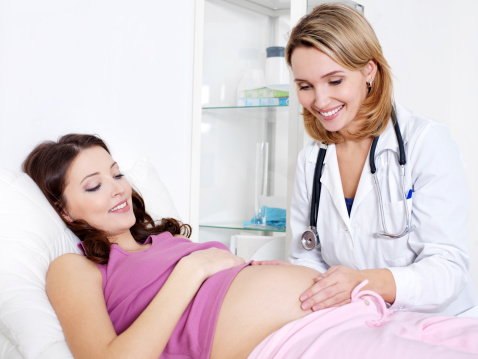Sleep in Pregnancy

By: Megan Lutz, MD MPH • Posted on November 06, 2014
While a good portion of “pregnancy stories" might discuss food cravings, weight changes, or relationship “learning opportunities," sleep changes in pregnancy make up these stories as well. Whether it's the notorious fatigue, nausea or daytime sleepiness of the first trimester that spells out pregnancy for your co-workers and family members (well before you planned to share your news), or the third trimester insomnia, it's important to know that many pregnancy sleep changes are considered normal, expected changes during pregnancy.
Just as much as your sleep profile may change, pregnancy also brings about an increase in sleep disorders. This column aims to provide you with more insight regarding sleep in pregnancy so that you, your baby, and those sleeping in the same room can thrive.
Pregnancy and Associated Sleep Changes
Both the striking hormonal changes and physical discomforts can profoundly alter sleep during pregnancy. For instance, the third trimester is not complete without the following symptoms:

- urinary frequency
- backaches
- general abdominal discomfort
- contractions
- heartburn
- restless legs
- leg cramps
- fetal activity
Interestingly, melatonin levels, which regulate our circadian “sleep-wake" cycles, do not change during pregnancy.
Decreased REM Sleep During Pregnancy
It has been well documented that pregnancy brings decreased REM sleep (rapid eye movement) and decreased Stages 3 and 4 sleep. REM is important for brain functioning, and stages 3 and 4 are the stages of deep sleep and rest. In addition, as pregnancy progresses, sleep efficiency decreases and unfortunately awake time increases. After delivery, REM and Stage 3 and 4 sleep durations return to normal, but because of newborn needs, sleep inefficiency and increased awake time persist. For first time parents, these changes can be quite taxing.
Although sleep changes are expected, it is important to talk with your doctor about your sleep changes because health care providers can help recognize changes that could signal unhealthy processes, such as:
- Sleep apnea
- Restless legs
Sleep Apnea
Physical changes of pregnancy may provoke sleep apnea in the person who tends to snore outside of pregnancy. Sleep apnea may affect the growth of the fetus and maternal blood pressure. Tell your doctor if you already have sleep apnea, in case changes to your treatment are necessary throughout pregnancy.
Restless Leg Syndrome
Restless leg syndrome is characterized by unpleasant sensation in the legs and tends to occur in the evenings, sometimes preventing people from falling asleep. The third trimester of pregnancy has been identified as one trigger for Restless leg syndrome, and it does resolve in the first few weeks following delivery. Tell your doctor about these symptoms as well, because sometimes, vitamin or iron deficiencies can be detected.
Leg Cramps
Leg cramps frequently occur at night in the third trimester. A cramp is your body's way of saying, “I need more oxygen!" We feel cramps when we sprint and don't breathe properly. We feel a cramping sensation in the uterus during labor contractions, when the uterine muscle is squeezing down on the blood vessels and intermittently disrupting the blood supply to the uterus. Leg cramps can also be due to the rapid growth of the baby stripping nutrients out of your blood. So a healthy diet, including adequate calcium and vitamin D is important. You might want to try a magnesium supplement with your OB's permission if you have leg cramps.
We feel cramps in our legs when an enlarged uterus is compressing the blood supply to our legs in the lying down position of sleep. You may feel most comfortable sleeping on your left lateral side. Tell your doctor if you are experiencing a lot of leg cramps. Electrolytes, including calcium, but also iron deficiencies may be occurring. Remember, iron rides on hemoglobin in your blood stream, and hemoglobin is the vehicle delivering oxygen to your entire body. If you experience leg cramps at night, try the following:
- Take long relaxing deep breaths and your cramp will go away.
- Stay well hydrated.
- Do regular stretching exercises.
Mastering this deep breathing technique now will help you cope with a little more confidence during the pain of labor contractions!
Remember, you are becoming a small modern day hero by learning to navigate these amazing bodily challenges in a healthy way. Learning good coping habits in pregnancy will pay off when you encounter other challenges of a newborn in your household. The first few weeks with a newborn at home can be some of the most sleep depriving times of your family's life. If not properly recognized, sleep deprivation can send anyone into a downward spiral of emotions and spousal relationships. We don't want that for you during pregnancy or your first weeks with a newborn. Ask for help from your doctors, from your family members and friends. A proper amount of rest is an essential pillar for healthy living.
And for more information on sleep during pregnancy, join our Sleep in Pregnancy Webchat on January 13 at Noon.
Be Strong, Be Healthy and Be in Charge!
- Megan Lutz, MD MPH
Related Articles
- 5 Tips For New Moms
- New Mom’s Food Fight: Breast Milk vs. Formula
- Myths and Facts About Sleep
- Sleep Glossary
- Tips for a Good Night’s Sleep
- Causes of Sleep Problems
- Are You Getting Enough Sleep?
- Sleep in Your Baby’s First Year
- Helping You Achieve the Right Weight for a Healthy Pregnancy
- New Options Are Improving the Odds of Becoming Pregnant
